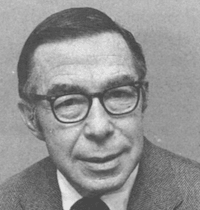William G. Dauben
1919 – 1997
Bill Dauben, Professor Emeritus of Chemistry at the University of California, Berkeley, and Editor-in-Chief of Organic Reactions from 1969 to 1988, died at his home January 2, 1997.
Bill was born in Columbus, Ohio, and received his B.A. degree from Ohio State University in 1941. His graduate work was at Harvard University under Louis Fieser, where he received his M.A. degree in 1942 and Ph.D. in 1944. He joined the faculty at Berkeley in 1945 as an instructor and became a full profes- sor in 1957. His arrival at Berkeley was contemporary with the start of two other distinguished Berkeley careers, those of Professors James Cason and Henry Rapoport. These three brilliant young scientists launched what would soon become a world-class program in organic chemistry at Berkeley. On his retire- ment from active teaching in 1990, Bill was awarded the Berkeley Citation in special recognition of his outstanding career in teaching, research, and University service.
He maintained an active research program throughout his career, even until the time of his death. During his more than 50-year academic career at Berkeley, Bill directed the research of more than 200 undergraduate, graduate, and post-doctoral students. Bill’s research interests were unusually diverse, and they had a profound impact on the development of synthetic organic and natural products chemistry, physical organic chemistry, and photochemistry in the second half of the 20th century. Dauben’s early work on the biosynthesis of steriods influenced not only the development of the squalene hypothesis but also our current understanding of the complex photochemistry of vitamin D derivatives. Dauben was a seminal figure in the field of diene and polyene photochemistry, the solvolyses of bridgehead carbinols and amines, and the stereoselective synthesis of complex polycyclic steroids and terpenes. He developed the use of CrO3-pyridine for extremely challenging natural product syntheses, including kempene, crassin methyl ester, spatol, and the ceroplastin nucleus.
Bill was elected to the National Academy of Sciences in I970, and from |977-l98l chaired the Chemistry Section. He received numerous honors from the American Chemical Society, including the California Section Award, the Ernest Guenther Award, and the Arthur C. Cope Scholar Award. Among the numerous international awards Bill received are a Senior U.S. Scientist Award from the Alexander von Humboldt Foundation, an honorary doctorate from the University of Bordeaux, a Japan Society for the Promotion of Science Award, and honorary membership of the Pharmaceutical Society of Japan.
Bill’s service to the organic chemistry community was profound. He served on the Medicinal Chemistry Study Section of the National Institutes of Health, the Chemistry Panel of the National Science Foundation, the editorial boards of the Journal of Organic Chemistry, Organic Syntheses, and Steroids, and chaired the American Chemical Society Committee on Publications. Bill’s role in directing the publication and operation of Organic Reactions spans nearly 30 years and cannot be overestimated. He joined the Editorial Board as Editor-in-Chief in 1969 and as President of Organic Reactions Inc. He held both positions for 19 years! In 1988, he relinquished these posts but remained an active member of the Board of Directors until his death. Bill’s leadership over the above 28-year period helped define the very nature of today’s Organic Reactions. He recruited many of the Editors and Directors currently active, and was instrumental in appointing Robert Joyce and Robert Bittman as current Editorial Coordinator and Secretary, respectively. It is regrettable that Bill just missed seeing the Golden Anniversary Volume, Organic Reactions, Volume 50, reach the organic chemistry community to which he has dedicated his entire illustrious career.
Bill Dauben is survived by his wife, Carol, his daughters Barbara Baumer of Portland, Oregon, and Ann Klaus of College Station, Texas, and two grand-children.


